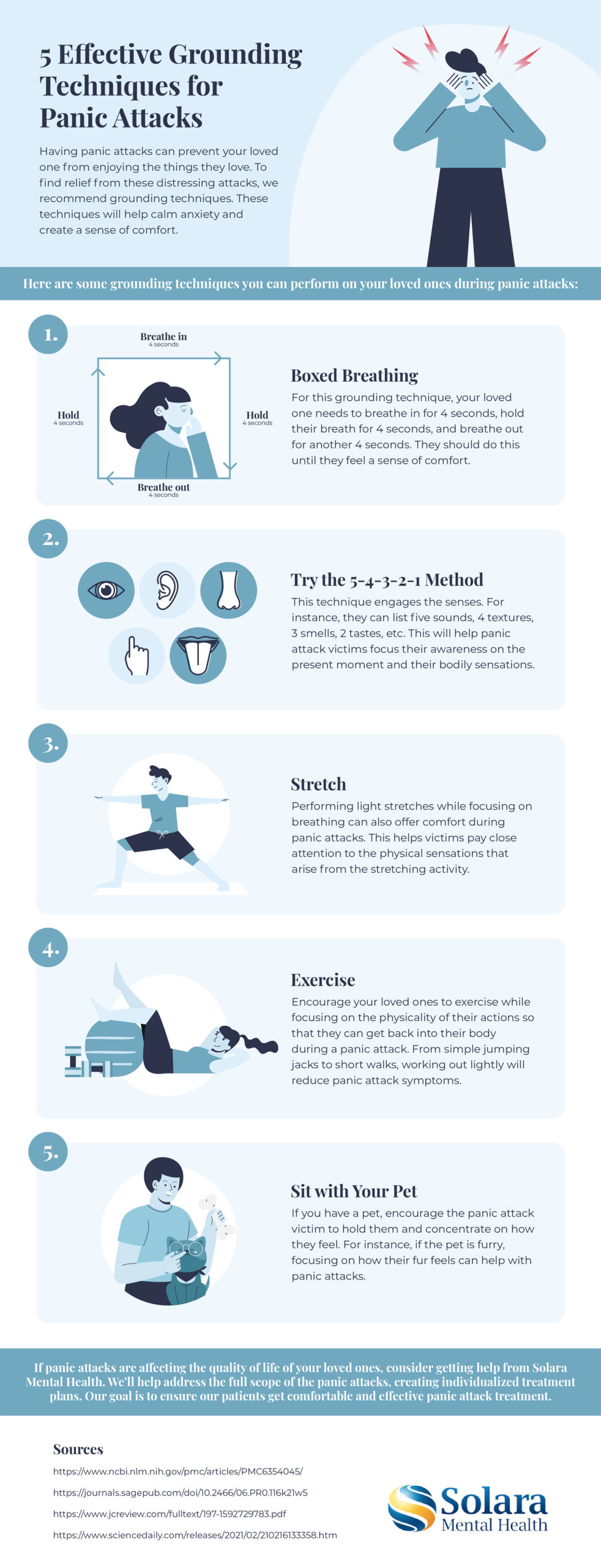According to the Anxiety & Depression Association of America, about 3% of American adults struggle with a panic disorder each year. Women are also twice as likely to develop a panic disorder than men.
Is someone in your life struggling with a panic disorder and panic attacks?
This guide will help you learn how to ground someone having a panic attack. Keep reading to learn what you can do.
Symptoms to Look Out for
A panic disorder is characterized by recurring panic attacks. These attacks are best described as moments of intense fear.
There are many panic attack warning signs to look out for, including some of the most common physical signs. Many people experience dizziness, shortness of breath, a rapid heartbeat, and trembling during a panic attack.
A looming fear of death is another familiar feeling. Recurring panic attacks may lead someone to isolation and loneliness. At Solara Mental Health, you can receive specialized care for this debilitating disorder.
You Might Need to Get Help
While most panic attacks are short, some of them can last hours. One panic attack can lead to another.
If your loved one requires emergency assistance, immediately contact help. Panic attack symptoms are similar to heart attack symptoms. If your loved one is experiencing chest pain and hasn’t had a panic attack before, you should call 911.
A sign of worsening conditions can manifest itself if the pain moves to the shoulder or army during a panic attack. In the event of a worsening condition, a medical provider should be notified immediately.
Stay Calm Yourself
People with anxiety are experiencing very intense feelings and symptoms during a panic attack. One easy way to help ground them through that experience is to remain calm.
While you might feel scared yourself, showing that you’re afraid can worsen the person’s panic attack. Remaining steady by your loved one’s side can help them stay present and know that they can get through what they’re feeling.
It is one way to help control the environment around your friend or family member. They’ll feel protected knowing someone is there to hold them through this experience.
Talk Positively
Talking positively and gently is another way to help ground someone having a panic attack. Tell them that they are experiencing a panic attack. Recognizing what they’re feeling by name can relieve their fear.
Validate what they’re going through and offer positive statements. Tell them that what they’re experiencing will pass. Let them know that although it’s scary and uncomfortable, they can get through it.
Having a conversation with someone as they are having a panic attack can help keep them distracted from the more extreme feelings.
Provide Space if Needed
Anxiety and stress affect every person differently. One person with anxiety and experiencing a panic attack might feel comforted and grounded by having someone to talk to, and someone else might not.
Your friends or family members might feel better grounded by being given more space. The intensity of the panic attack might make talking too overwhelming.
Reassure your loved one that you’re available but give them the space they need to push through the panic attack themselves if that helps them best.
Ask How Else You Can Help
Remember that those who struggle with a panic disorder know themselves and what helps them cope best. If you know a friend or a loved one who struggles with panic attacks you can talk to them about what you can do to help.
Your loved one might have a hard time speaking to you in the middle of a panic attack, but you’ll know what you can do if you’ve had a conversation with them before.
During the attack, you should still ask your friend what you can do to help. What works today might not work tomorrow and it’s important to do everything you can to help them feel better.

Help Them With Some Grounding Techniques
There are different grounding methods you can try with your friend during their panic attack. These techniques can help them recenter themselves.
Four practical techniques:
- If they can move, ask your friend to sit down in a comfortable chair with their feet on the floor. This can help them regain control of their surroundings.
- You can also try the 5-4-3-2-1 technique. This grounding method uses the five senses to help the person focus on other things in the room and not on their panic attack.
- Have your friend identity five things they can see, four they can touch, three things they can hear, two things they can smell, and one thing they can taste.
- Another grounding tool would be to remind them to remain calm and take slow and deep breaths in and out. Helping your loved one control their breathing is the best way to push through a panic attack. Have your friend copy this pattern so they can recenter themselves.
Continue to Provide Support
Friends offer emotional support when you need it. It is why they’re an essential part of life. It’s imperative to continue to support your friend as they learn to manage their panic disorder.
They might feel embarrassed about you having witnessed their panic attacks, but you should let them know that you’re there to support them fully. Check-in from time to time and learn the best ways to help them.
When your friend doesn’t have to worry about feeling embarrassed, there’s one less thing they have to feel stressed about. It can help them work through their panic disorder too.
How to Ground Someone Having a Panic Attack Explained
It’s vital to learn how to ground someone having a panic attack, especially if it’s your loved one struggling with panic disorder. You can help with grounding techniques and positive statements during a panic attack.
Contact Solara Mental Health if your loved one needs professional help to work through this disorder. We’ll be happy to answer any questions you may have.


